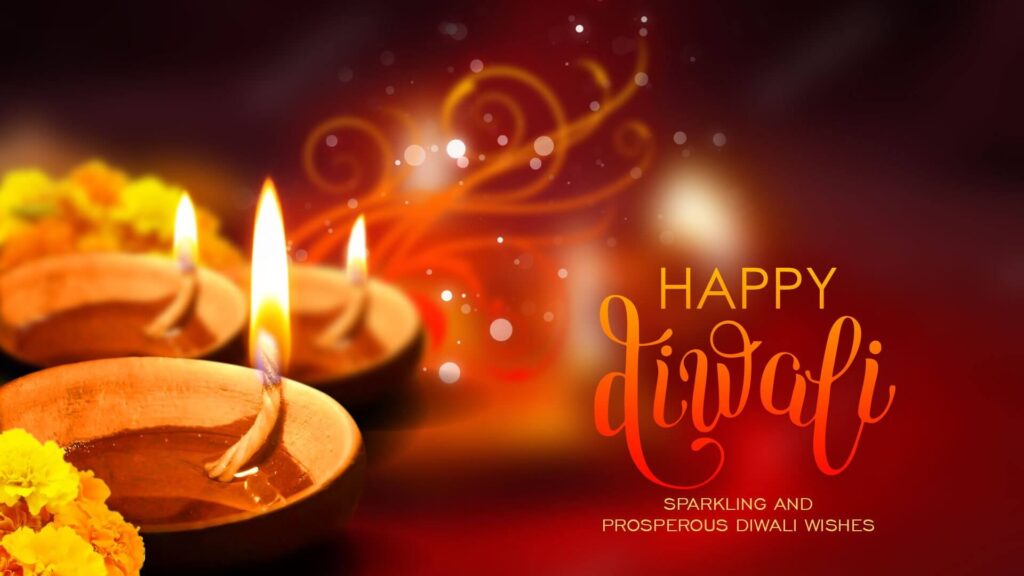Diwali falls in either October or November each year, depending on the cycle of the moon. It’s observed on the 15th day of Kartik, the holiest month in the Hindu lunar calendar.
- In 2020, Diwali is on November 14. (See calendar).
- In 2021, Diwali is on November 4.
- In 2022, Diwali is on October 24.
Diwali Dates Detailed Information
The Diwali festival actually runs for five days, with the main event happening on the third day in most places in India. It’s associated with Lord Ram’s return to his kingdom in Ayodhya after exile and rescuing his wife from demon king Ravan on Dussehra. However, in south India, the festival is observed as the defeat of Narakasura. It’s a one-day celebration, known as Deepavali, that usually falls a day before the main Diwali date but sometimes occurs on the same day (when the lunar days overlap).
The festival isn’t celebrated in Kerala though. Goddess Lakshmi, the goddess of good fortune and prosperity, is the primary deity worshiped during Diwali. Each day has a special significance as follows.
-
- The first day (November 12, 2020) is known as Dhanteras, or Dhanatrayodashi. “Dhan” means wealth and “teras” refers to the 13th day of a lunar fortnight on the Hindu calendar. Lord Dhanvantari, the Hindu god of medicine and an incarnation of Lord Vishnu, is said to have brought Ayurveda and the nectar of immortality to mankind on this day. There are a number of temples in Kerala and Tamil Nadu dedicated to Dhanvantari and Ayurveda. Legend also has it that Goddess Lakshmi was born from the churning of the ocean on this day, and she is welcomed with a special puja (ritual). Gold and other metals (including kitchen utensils) are traditionally purchased. People also gather to play cards and gamble, as it’s thought to be auspicious and will bring wealth throughout the year.
-
- The second day (November 13, 2020) is known as Naraka Chaturdasi or Chhoti Diwali (small Diwali). “Naraka” means hell and “Chaturdashi” means 14th day of a lunar fortnight on the Hindu calendar. Goddess Kali and Lord Krishna are believed to have destroyed the demon Narakasura on this day. Demon effigies are burned in Goa in celebration. In 2020, Naraka Chaturdasi overlaps with Amavasya and falls on the same day, on November 14.
- The third day (November 14, 2020) is the new moon day known as Amavasya. This darkest day of the month is the most significant day of the Diwali festival in north and west India. Lakshmi is worshiped on this day, with a special puja performed in the evening. Goddess Kali is also usually worshiped on this day in West Bengal, Odisha and Assam (although Kali Puja sometimes falls a day earlier depending on the lunar cycle). The south Indian Deepavali festival is also celebrated on this day in 2020.
-
- The fourth day (November 15, 2020) has various meanings across India. In north India, Govardhan Puja is celebrated as the day when Lord Krishna defeated Indra, the god of thunder and rain. In Gujarat, it’s celebrated as the start of a new year. In Maharashtra, Karnataka and Tamil Nadu, the victory of Lord Vishnu over demon king Bali is celebrated as Bali Pratipada or Bali Padyami.
- The fifth day (November 16, 2020) is known as Bhai Duj. It’s dedicated to celebrating sisters, in a similar way that Raksha Bandhan is dedicated to brothers. Brothers and sisters get together and share food, to honor the bond between them.
More Information About Diwali
Find out more about the meaning of the Diwali festival and how it’s celebrated in this Essential Diwali Festival Guide.
Wondering where’s best to join in the Diwali celebrations? Take a look at these diverse Ways and Places to Celebrate Diwali in India.
Source: tripsavvy.com


